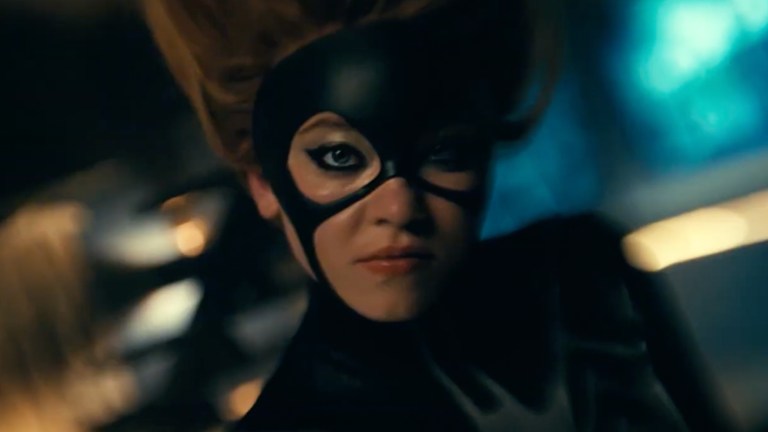The Best Part of Madame Web Happens After the Credits
Madame Web is a terrible movie, but at least it has the good sense to skip the post-credit scene.

This post contains spoilers for Madame Web.
There are exactly two good things in Madame Web. No, it’s not the meme-worthy line about moms and Amazons, which doesn’t even appear in the movie. Neither is it all of the winks toward Peter Parker nor the young female Spider-heroes who (spoiler) have only two brief scenes in costume.
No, one good thing in Madame Web is the old-school Marvel logo that opens the film. The simple flipping of comics pages that dissolves into the big red block with the word “Marvel” in white font, before MCU movies replaced it with their busy fanfare.
The other good thing happens at the end of the movie. Or rather, it doesn’t happen. Because after Madame Web‘s closing scene, a very stupid looking close-up on Cass Web’s blank face, played by the ever-wooden Dakota Johnson, credits roll and that’s it. There is no post-credit scene in Madame Web. We can all go home and forget this ever happened.
To be clear, a post-credit scene isn’t necessarily a bad thing. They make sense as part of a comic book adaptation, bringing to movies the cliffhangers and teases common in the original medium. Inspired by a medium built on serialized, shared universe storytelling, these sorts of teases make sense, and many of them are memorable. Think about the last panel of 1980’s X-Men #181, which sees a battered Wolverine in the sewers below the Hellfire Club, who just trounced the team. “Okay, Suckers… you’ve taken your best shot!” growls Wolvie in an awesome shot drawn by John Byrne and Terry Austin, and written by Chris Claremont. “Now it’s my turn!”
There have been plenty of great post-credit scenes in comic book movies. Even before the MCU, there were jokes like Ferris Bueller mocking the audience for sticking around or Animal demanding the viewer “Go home!” after The Muppet Movie. Even Marvel copies the tease at the close of every 007 film, which promises that James Bond will return.
And to be sure, the MCU has given viewers some outstanding post-credit scenes over the years, including the Nick Fury reveal at the end of Iron Man and the great Captain America gag finishing Spider-Man: Homecoming.
But how many times have post-credit scenes in superhero movies promised something that never came to be? A few MCU moments come to mind, such as Dane Whitman looking at the Ebony Blade in Eternals or Baron Mordo promising to rid the world of sorcerers in Doctor Strange. And then there’s all of the lackluster scenes in franchises trying to emulate the MCU: Deathstroke and Lex Luthor contemplating a “league of their own” in Justice League, the 2016 Ghostbusters asking “Do you know Zuul?” or Davy Jones returning at the close of Pirates of the Caribbean: Dead Men Tell No Tales.
More often than not, post-credit scenes are annoying and studio-mandated attempts to build an MCU-style shared universe. But the MCU benefited from decades’ worth of stories to adapt and (unlike the DCEU) audience investment in the characters. Even those who didn’t know anything about, say, the Maximoff twins teased in Captain America: The Winter Soldier, were excited to see these new additions to a universe that they cared about.
But while some fans thrilled at the “Tommy Oliver” name-drop in Power Rangers or the balloon boy of Five Nights at Freddy’s, both of these instances did little more than please the hardcore viewers and mystify others. The difference between these name drops and those of the MCU in its prime? People enjoyed the movie that came first, and wanted more. These bad post-credit sequences stem not from compelling storytelling, but from allegiance to corporate intellectual property, catechizing disciples of the brand by asking them to recite the names of characters and events hinted at in the film. They demand loyalty by asking viewers to buy tickets and merch for the next entry, regardless of quality.
Sadly, the recent MCU has too often gone the way of its imitators. After delivering the goopy snooze-fest that was Eternals, Marvel Studios hoped Harry Styles (and maybe Patton Oswalt?) would leave viewers on an excited note. After the fun, but messy The Marvels, the studio hoped that the appearance of Kelsey Grammer’s Beast would bring the crowds back for more.
In short, post-credit scenes have become a way for studios to cover over a sub-standard film. They attempt to trick audiences into forgiving the sloppy movie they just watched by promising to do better next time.
Madame Web may very well be the worst superhero movie of all time, a soulless product of IP nonsense that no one, least of all the actors on screen, seems to cares about. But at least it had the dignity to avoid promising a better movie next time. May other studios start to do the same.
Madame Web is now in theaters.
